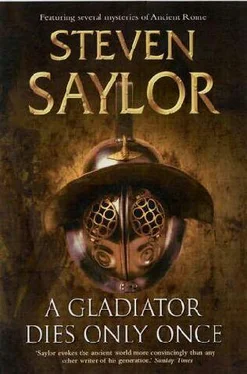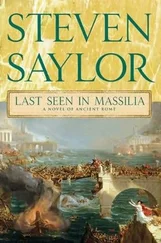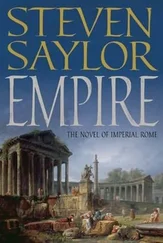Steven Saylor - A Gladiator Dies Only Once
Здесь есть возможность читать онлайн «Steven Saylor - A Gladiator Dies Only Once» весь текст электронной книги совершенно бесплатно (целиком полную версию без сокращений). В некоторых случаях можно слушать аудио, скачать через торрент в формате fb2 и присутствует краткое содержание. Жанр: Исторический детектив, на английском языке. Описание произведения, (предисловие) а так же отзывы посетителей доступны на портале библиотеки ЛибКат.
- Название:A Gladiator Dies Only Once
- Автор:
- Жанр:
- Год:неизвестен
- ISBN:нет данных
- Рейтинг книги:5 / 5. Голосов: 1
-
Избранное:Добавить в избранное
- Отзывы:
-
Ваша оценка:
- 100
- 1
- 2
- 3
- 4
- 5
A Gladiator Dies Only Once: краткое содержание, описание и аннотация
Предлагаем к чтению аннотацию, описание, краткое содержание или предисловие (зависит от того, что написал сам автор книги «A Gladiator Dies Only Once»). Если вы не нашли необходимую информацию о книге — напишите в комментариях, мы постараемся отыскать её.
A Gladiator Dies Only Once — читать онлайн бесплатно полную книгу (весь текст) целиком
Ниже представлен текст книги, разбитый по страницам. Система сохранения места последней прочитанной страницы, позволяет с удобством читать онлайн бесплатно книгу «A Gladiator Dies Only Once», без необходимости каждый раз заново искать на чём Вы остановились. Поставьте закладку, и сможете в любой момент перейти на страницу, на которой закончили чтение.
Интервал:
Закладка:
He gazed at me angrily, than his features gradually softened. His eyes glistened. A tear ran down one cheek. "I have led an honorable life. I have served Rome to the very best of my ability. I have been generous to my friends, forgiving to my enemies. I love life dearly. At last, I am about to have a child! Why must this shameful fate befall me? If the child is a son, will it befall him as well? My body is still strong; I may live many years yet. What's to become of me in the time I have left, if I lose my senses? Have the gods no mercy?"
I looked upon Lucullus and shivered. I saw a man surrounded by opulence beyond measure, at the summit of his career, adored by the multitude, beloved by his friends-yet utterly alone. Lucullus possessed everything and nothing, because he had no future.
"The gods have much to answer for," I said quietly. "But while you still can, you must struggle against your delusions, especially those which pose a danger to others. Renounce this idea you have about Motho, Lucullus. Say it aloud, so that Marcus can hear."
His face became a tragedy mask. The struggle within him was so great that he trembled. Marcus, weeping more openly than his brother, gripped his arm to steady him.
"Motho… is not Varius. There, I've said it! Though every fiber of my being tells me it's a lie, I'll say it again: Motho is not Varius."
"Say that you won't harm him," I whispered.
Lucullus shut his eyes tightly and clenched his fists. "I shall not harm him!"
I turned and left the brothers alone, to find what comfort they could beneath the branches of the cherry tree called Most-Precious-of-All.
So I came to taste my first cherry; so I made the acquaintance of Lu-cullus, to whom I never spoke again.
The months that followed marked the pinnacle of a life which, to any outsider, must have appeared especially blessed by the gods. Lucullus celebrated a magnificent triumph (at which the rebel general Varius did not appear). Also, a son was born to him, healthy and whole. Lucullus named the boy Marcus, and was said to dote upon him shamelessly. His marriage to Servilia was less happy; he eventually accused her of adultery and divorced her. Whether the charge was true, or the result of a delusion, I never knew.
Those months brought other changes, some very sad. Our conversation about Lucullus was one of my last encounters with my dear friend, Lucius Claudius, who fell dead one autumn afternoon in the Forum, clutching his chest. To my astonishment, Lucius did make me heir to his Etruscan farm-he had not been jesting that day in his garden. At about the same time, Cicero defeated Catilina and won his campaign for the consulship, making him a New Man among the nobility-the first of his family to attain Rome's highest office. Of my move to the Etruscan countryside, and of the great and tragic events of Cicero's consulship, I have written elsewhere.
An era of enormous tumult was beginning. Steadfast Republicans like Cicero and Cato desperately looked to Lucullus, with his immense wealth and prestige, to rise up as a bulwark against the looming ambitions of warlords like Caesar and Pompey. Lucullus failed to meet their expectations. Instead he withdrew more and more from public life into an existence of sensual pleasure and seclusion. People said Lucullus had lost his ambition. Conventional wisdom presumed he had been corrupted by Greek philosophy and Asian luxury. Few knew that his mind had begun rapidly to fail, for Lucullus and Marcus did everything possible to hide that fact for as long as they could.
By the time of his death, several years after I met him, Lucullus was as helpless as a baby, completely under the care of his brother. A curious rumor attended his demise: one of his beloved cherry trees had died, and Lucullus, denied the delicacy he most desired, had lost the will to live.
Lucullus had faded from the scene, but the people of Rome re-called his glory days and reacted strongly to his death. Great funeral games were held, with gladiatorial contests and reenactments on a
massive scale of some of his more famous victories. During the period of public mourning, his gardens were opened to the public. I braved the crowds for the chance to see them again. If anything, the exotic flowers were more beautiful and the foliage more luxuriant than I remembered.
Escaping from the crowd to walk down a secluded pathway, I came upon a gardener on all fours, tending to a rose bush. The slave heard my approach and glanced up at me with his single eye. I smiled, recognizing Motho. I thought he might recognize me in re-turn, but he said nothing, and with hardly a pause he went back to what he was doing.
I walked on, surrounded by the smell of roses.
HISTORICAL NOTES
"The Consul's Wife" grew out of two desires: to deal with Sempronia, one of the more remarkable women of her age, and to explore the role of the chariot race at this period of the Roman Republic. No one who saw the movie Ben-Hur as a child could ever forget the spectacular chariot race staged (long before the advent of computer-generated images) with live riders and horses and an audience of thousands. Ben-Hur left indelible images in my mind; for further research, I turned to Sport in Greece and Rome by H. A. Harris (Thames and Hudson/Cornell University Press, 1972), a very British take on Roman racing and gambling that includes an amusing list of translated Latin names for actual horses.
The Daily Acts referred to in the story actually existed, as we know from references to the Acta Diuma in Cicero and Petronius; my use of the Daily Acts owes a debt to a very funny but painfully dated hard-boiled mystery titled The]ulius Caesar Murder Case by
Wallace Irwin, published in 1935, in which the intrepid "reporter" Manny (short for Manlius) snoops out trouble along the Tiber.
As for Sempronia, readers may learn more about her in Sallust's Conspiracy of Catiline, which gives an intriguing description of her pedigree, character, and motives; not only did she play a small role in that conspiracy, but she was the mother of Decimus Brutus, who with the more famous Junius Brutus was one of the assassins of Caesar. In an early draft of my novel Catilina's Riddle, I wrote a lengthy passage describing her, which I later decided to cut; I was glad to be able to return to Sempronia in "The Consul's Wife." "That she was a daughter of Gaius Gracchus is unlikely," writes Erich Gruen in The Last Generation of the Roman Republic (University of California Press, 1974), but it is intriguing to speculate that Sempronia might nonetheless have been a descendant of that radical firebrand of the late Republic who was murdered by the ruling class and achieved the status of a populist martyr.
"If a Cyclops Could Vanish in the Blink of an Eye" reflects on the domestic life of Gordianus. Cats were still something of a nov-elty in Rome at this time, and not universally welcomed. The cultural clash of East and West, as exemplified by the different worldviews of Gordianus and the Egyptian-born Bethesda, will increasingly become a part of the fabric of cosmopolitan Roman life, as the emerging world capital attracts new people and new ideas from the faraway lands drawn into her orbit.
Of all the historical incidents between Roman Blood and Arms of Nemesis, the most notable is the revolt of Sertorius; "The White Fawn" tells his story. The fabulous tale of the white fawn is given in several sources, including Plutarch's biography of the rebel general. The discontent of those who flocked to Sertotius's side presages the growing discord in Rome, where a series of escalating disruptions will eventually climax in the civil wars that put an end to the republic forever.
In 2000, on a book tour to Portugal, my publisher arranged a pri-vate tour of the excavations of a garum manufactory located directly beneath a bank building in downtown Lisbon (ancient Olisipo); that experience inspired me to take Gordianus to such a manufactory, and to uncover "Something Fishy in Pompeii." Readers craving a taste of garum can make their own; consult A Taste of Ancient Rome by llaria Gozzini Giacosa (University of Chicago Press, 1992), which gives the recipe of Gargilius Martialis, who wrote in the third century A.D.
Читать дальшеИнтервал:
Закладка:
Похожие книги на «A Gladiator Dies Only Once»
Представляем Вашему вниманию похожие книги на «A Gladiator Dies Only Once» списком для выбора. Мы отобрали схожую по названию и смыслу литературу в надежде предоставить читателям больше вариантов отыскать новые, интересные, ещё непрочитанные произведения.
Обсуждение, отзывы о книге «A Gladiator Dies Only Once» и просто собственные мнения читателей. Оставьте ваши комментарии, напишите, что Вы думаете о произведении, его смысле или главных героях. Укажите что конкретно понравилось, а что нет, и почему Вы так считаете.










